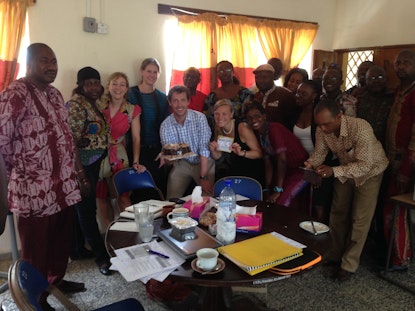Getting a Good Deal from Petroleum and Mining: Introduction to legal and fiscal frameworks in Sierra Leone

“Disclosure of contracting information is crucial to getting better, more stable deals out of mineral and oil contracts – there is no doubt about it,” opens Susan Maples, an independent oil and mining lawyer, at a recent training in Freetown, Sierra Leone. “However,” she continues, “disclosure is only one part of the story. The ability of the broad public, civil society organizations and even technical government staff to read and understand contracts and the crucial issues being dealt with in such a document respectively is pivotal for the use of the disclosed contract information – in terms of current contracts but also upcoming ones.” In other words, if nobody makes use of transparent information, transparency cannot lead to accountability.
The missing link between transparency and accountability has long been identified by the Sierra Leone National Minerals Agency (NMA) and Civil Service Training College (CSTC), which is why they worked with GIZ to develop a training on how to read and understand mining and oil contracts, laws and policies. The initiative is funded by the German Federal Ministry for Economic Cooperation and Development and implemented on their behalf by GIZ.
After a 2-day pilot was held in November 2013, the first full week training was conducted in Freetown in May 2014 together with the Columbia Center on Sustainable Investment, Open Oil, Independent Social Performance, and the law firm Jones Day.
The 20 participants came from various government institutions, including the Ministry of Mines and Mineral Resources, National Minerals Agency, Ministry of Finance, Environmental Protection Agency, Strategy and Policy Unit and others.
Mye Bangura, the principal of the Civil Service Training College, explains why the first group of beneficiaries were chosen to be government officials: “Firstly, training government officials to be able to understand mining and oil contracts is vital for a government’s ability to implement these contracts.” Nadine Stiller from GIZ adds, “enabling a wide range of government officials to better understand the issues in and around a contract will put them in a better position to assess and question the quality of deals that are being negotiated.”
The training was facilitated by four international consultants, with the independent lawyer Susan Maples and Columbia University Economist Nicolas Maennling in the lead. As the participants brought a wide range of expertise and experience to the room, a group of potential future trainers was identified. In an upcoming training-of-trainers intervention these local experts will be qualified to deliver the training going forward.
The leader of the Sierra Leone negotiation team, Herbert M’cleod, joined the group for a morning to share first hand experience from the negotiation room.
The trainings can be seen as a contribution towards the international trend of promoting disclosure and participation along entire contracting chain as promoted by the Open Contracting Partnership (OCP).
For more information, contact Nadine.Stiller@giz.de